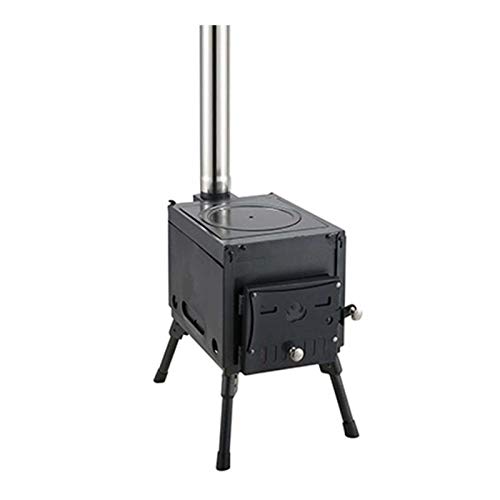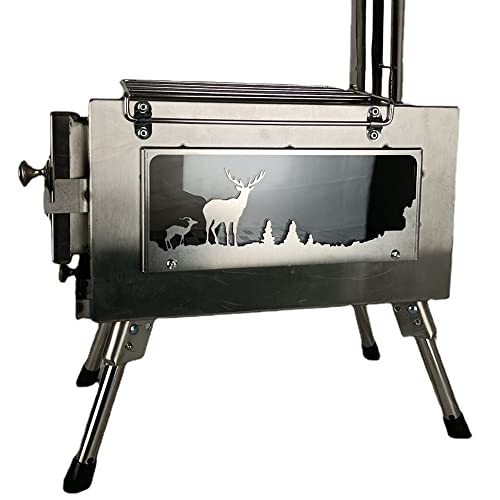Woodburner Stove Tools To Streamline Your Daily Lifethe One Woodburner…
페이지 정보
작성자 Zelma 댓글 0건 조회 183회 작성일 24-09-22 05:20본문
 The Benefits of a Woodburner Stove
The Benefits of a Woodburner StoveWood stoves produce fire and heat through continuous airflow. The dampers are typically located in the stove's door. They allow fresh air to be drawn into. The exhaust gases are drawn through a chimney and then safely out of your home.
Modern wood stoves that do not have catalytic technology rely on secondary combustion to increase their efficiency. However, they will inevitably develop creosote when not used properly.
Energy Efficiency
Modern woodburner stoves are engineered to maximize heating efficiency and the combustion process being designed to burn firewood efficiently possible. This means that a greater proportion of the fuel is converted into heat, and less goes to waste as gas or smoke.
The most important thing to take into consideration when selecting a woodburner stove is the heating output that is measured in BTU per hour. This figure gives you an idea of how much heat the stove can produce, and it's normally an accurate indication of its capacity to effectively heat your home.
When comparing wood burning stove outdoor stoves it's also worth looking at the efficiency of combustion and heating transfer efficiency. The efficiency of combustion is how much of the fuel can be converted into useful heat, and the efficiency of heating transfer measures how the stove is able to convert that heat to warm air in your home.
Stoves with catalytic combustor may achieve very high levels of efficiency in combustion, as the combustor is able to re-burn some of the gasses that have escaped the initial combustion process. This helps in cleaning the exhaust gases and reduces the amount of flammable chimney deposits called creosote. Modern non-catalytical stoves remain extremely efficient. However they tend to burn hotter and perform less well at lower temperatures.
It's worth bearing in mind that the efficiency of energy used by a stove is only dependent on the quality and condition of the fuel that powers it. It is best to utilize dry and seasoned wood than green wood which has more moisture. It is also a good idea to select a stove which is designed for logs, as burning other types of combustibles can cause problems with the combustion process and lead to excessive emissions or even chimney fires.
Always ensure that your stove is properly insulated and the windows and doors are shut tightly when not in use. You should also have your flue vent cleaned by professionals on a regular basis. You should also regularly check and clean the stove's interior and it's recommended you clean out the chimney every couple of weeks.
Clean Burning
Wood burners are the eco-friendly option if used in the right way. It is a renewable fuel that is mostly carbon-neutral (the amount of carbon dioxide released during combustion is exactly the same as the amount that the tree absorbs over its lifetime).
You will also be in a position to avoid having to rely on large energy companies which are subject to price increases or, even worse they have monopolies on certain areas. This leaves you vulnerable to their prices. In addition, you'll be in a position to watch the amount of wood in your stove and buy it when you need it.
A number of the latest log burning stoves such as the Stovax range of stoves, make use of a superior system of combustion that has been optimized to ensure high levels efficiency in heat and clean burning. The triple air system supplies air to the fire at two different stages. This allows for a faster ignition of the top layer as well as an improved control of the flaming. It also increases the efficiency of the thermal system and reduces emissions.
The best way to maximize the clean burn of a woodburner small woodburning stove is to use kiln dried logs that have been stacked and stored for a time prior to using. These have a lower moisture content therefore require less energy to move. Furthermore, if you stack your logs correctly and ensure that they are properly seasoned prior burning, you can attain an impressive level of efficiency that can be as high as up to 80%.
Wood smoke is full of a variety of harmful pollutants including fine particle pollution, volatile organic compounds, nitrogen oxides, and benzene that can all contribute to breathing problems. They are associated with heart and respiratory disease. Modern log burners are more efficient than older models, and when paired with an air quality monitor that measures gas concentration, they can reduce them to a minimum.
It is important to inquire with your local authority if you reside within Smoke Control Area prior to purchasing any kind of stove. You may need an approved stove from Defra to legally use the stove. Stoves that are Defra-approved are certified as being capable of operating under the provisions of the Clean Air Act, which makes it illegal to smoke from chimneys in certain locations.
Low Carbon
Wood stoves offer an environmentally green alternative to heating fossil fuels. They aid in reducing carbon emissions, which are a leading cause of global climate change. modern wood burning stove, energy-efficient wood burners emit significantly less greenhouse gases and particulates when compared to older wood burning stoves. They can also be utilized to heat the house as well as cook.
The key to getting the most environmentally friendly use out of your wood-burning stove is ensuring the logs are dry before you burn them. It can take a while to dry wood, but it is worthwhile. If you have the space to build a log store, and manage to keep your logs dry, then you can save money on heating bills as well as benefiting from government support through the Renewable Heat Incentive.
Using a woodburner stove a few times per week can make a massive difference in your household's energy costs. However, it is crucial to remember that it's a second source of heat and not the main method. You should use it only when you absolutely need to, and ensure that your stove is of high-efficiency with low emissions.
If you decide to use an wood burning stove that has been certified by the EPA and you are certain that it will comply with the standards for low emissions to protect your health and the environment. Examine the metal tag on the stove you are using to cook on, check its owner's guide or consult EPA's certified wood stove list to see if it is EPA-certified.
A wood-burning stove that is EPA certified will also help preserve forests and habitats as well as biodiversity. If managed sustainably, forests will absorb carbon dioxide released through burning corner wood heater. Utilizing eco-friendly stoves that burn locally-sourced, sustainably harvested wood can also be an economic incentive to sustain forest management practices. This is based on the principles of circular economy, and ensures that forests are valued for their environmental benefits and timber supply.
Safety
Wood stoves give a lovely cozy and warm atmosphere to a space and can be an ideal focal area for families and friends to gather together. However, they can also release several dangerous gases into the air, particularly if not used correctly or with poor quality logs. They can also cause indoor air pollution due to smoky conditions.
To lessen the impact on your lungs and ensure that you have a safe and clean burning stove it is important that you follow these easy guidelines to use. These include using only properly dried, seasoned wood and regularly checking the stove to make sure that all the logs are combustion-proof. It is also a good idea, to use hearth mats that are specifically designed to shield your wood flooring from fire damage and to withstand the constant heat generated by the stove.
Another important tip is to avoid using lighter fluid. It is a very dangerous substance that is only suitable for starting a fire in an open flame, not in the closed wood burner. It could result in the wood burning at a faster rate, which could result in the formation of dangerous volatile compounds which, if inhaled, can be harmful to your health.
Keep pets and children away from the wood stove when it's in use. It is recommended to use a hearth pad that can be put under your stove to avoid embers falling onto the floor and causing damage. Installing smoke and carbon dioxide detectors is also suggested.
It is also recommended to be sure to have your chimney inspected at least once per year to ensure that it is functioning properly. A qualified professional can check the chimney to ensure that there is no creosote buildup and that it is not leaking.
Modern wood-burning stoves with integrated automation and monitoring, like the Catalyst smart wood stove, can be an excellent option for those looking for a high-performance efficient, eco-friendly, and friendly method of heating their home. This kind of stove can eliminate many of the issues that plague older stoves by automatically regulating the fire to ensure it is burning at a suitable level and avoiding overfiring, which can result in a fire that churns out more smoke, irritates your lungs, and causes more harm to your chimney.

댓글목록
등록된 댓글이 없습니다.